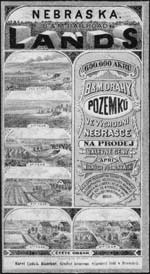During the last third of the 19th and the beginning of 20th century Nebraska was the point of destination of many immigrants from Europe and among them were many Czechs. Nebraska attracted them because of its cheap land, but also because it offered a place for the establishment of whole communities, including schools, cultural and intellectual life such as offered by theaters, publication houses, literary societies, and orchestras.
The majority of Czechs who settled in Nebraska were lettered, and eager to learn. They founded publishing houses, and printed newspapers and periodicals. There were at one time 48 titles of periodicals in Czech published in Nebraska alone. The settlers were eager to take advantage of the new democracy, absence of censorship and relative wealth. Very quickly a number of intellectuals, including writers, poets, and composers, arose in this fertile new society.
The Czech settlers shared their experience of democracy with their compatriots in their old country. They forged close ties, and eventually supported intellectually through translations, and publication of forbidden democratic documents, such as the United States Constitution, and later also financially the Czech democratic political opposition in the Austro-Hungarian Empire. This support led to the formation of free Czechoslovakia that eventually remained the only functioning true democracy in Central Europe during the period between the two wars.

These ties are illustrated in correspondence between the Czech and Slovak politicians with their American intellectual colleagues, deposited in countless local museums in the Great Plains, in books published on the American soil by publishers such as Rosicky in Omaha, and in the numbers of ethnic newspapers.
The inhabitants of ethnic towns in the Great Plains stopped transmitting the knowledge of the ancestral language. In a number of towns, such as Clarkson, that had a Czech newspaper until the 1980's, there is no speaker of the Czech language left. The documents that are in the local library have become unintelligible to the librarians. In the holdings can be found correspondence among writers and politicians such as the Benešes (the second president of the Czechoslovak Republic, and a university professor, and his brother, a writer). But there are also books of American writers who used the Czech language, compositions of Czech musicians, and illustrations of artists published in Czech periodicals who are by now virtually unknown.

In addition to those documents written in Czech, there are also documents significant for the Nebraska Czech culture written in English. Also to be found are documents in other formats worthy of preservation, such as photographs, music recordings, paintings, quilts, and other cultural artifacts.
PROJECT SUMMARY
This project will identify, inventory and whenever appropriate digitalize Czech heritage artifacts, which will be posted on the project webpage. In addition to the digitized form of certain notable artifacts, an inventory of other significant artifacts will be compiled and also placed on the webpage. The creation of an inventory and the digitization of certain notable artifacts will make the Czech culture of Nebraska and the Great Plains more accessible to researchers and the public. This project will be carried out under the auspices of Department of Modern Languages and the Regional Center for Humanities and in cooperation with the Czech Embassy in Washington D.C.